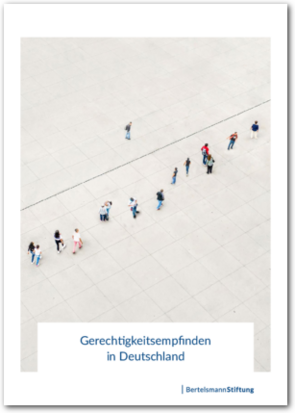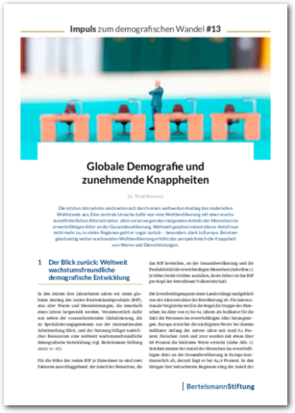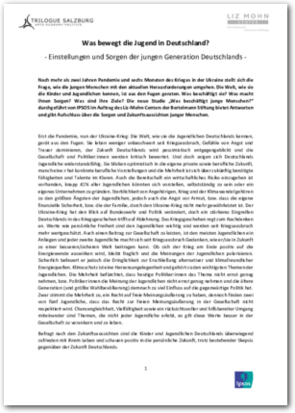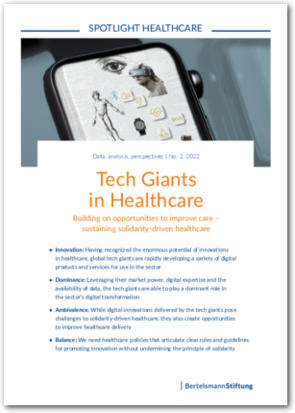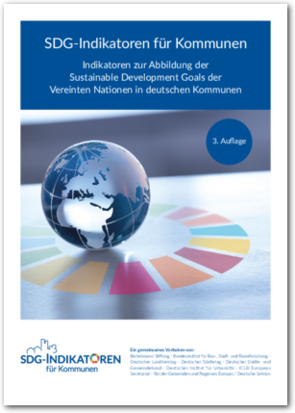Bertelsmann Stiftung (Hrsg.) (PDF)2022
Mehrheit hat das Gefühl, es gehe im Land nicht gerecht zu - weder bei der Verteilung von Gütern und Vermögen noch zwischen den Generationen. Das ist Anlass zur Sorge.
weiterlesen
Bertelsmann Stiftung (Hrsg.) (Broschur)2022
Wie werden patientenberichtete Gesundheitsdaten (PROMs) heute genutzt? Welche konkreten Hürden behindern die breitflächige Implementierung und welche Faktoren sind besonders förderlich? Dazu fand von Juli bis Dezember 2021 eine Online-Befragung unter PROM-Anwenderinnen und...
weiterlesen
Bertelsmann Stiftung (Hrsg.) (PDF)2022
Die Studie vermittelt auf Basis einer Bevölkerungsbefragung aktuelle Sichtweisen auf das Zusammenleben in der Einwanderungsgesellschaft. Die Perspektiven der Befragten mit und jenen ohne Migrationshintergrund werden dabei vergleichend dargestellt.
weiterlesen
Bertelsmann Stiftung (Hrsg.) (PDF)2022
Weltweit gesehen, nimmt der Anteil an Menschen im erwerbsfähigen Alter an der Gesamtbevölkerung nicht mehr zu und geht in manchen Regionen sogar zurück. Die Alterung und das gleichzeitige Wachstum der Weltbevölkerung dämpfen das Wirtschaftswachstum, was Wohlstandseinbußen...
weiterlesen
Liz Mohn Center gGmbH, Bertelsmann Stiftung (Hrsg.) (PDF)2022
Nach mehr als zwei Jahren Pandemie und sechs Monaten des Krieges in der Ukraine stellt sich die
Frage, wie die jungen Menschen mit den aktuellen Herausforderungen umgehen. Die Welt, wie sie
die Kinder und Jugendlichen kennen, ist aus den Fugen geraten. Was beschäftigt sie?...
weiterlesen
Bertelsmann Stiftung, Stiftung Münch (Hrsg.) (Broschur)2022
Bei der Umstellung der elektronische Patientenakte auf ein Opt-out-Modell sind die Ansprüche der Versicherten auf informationelle Selbstbestimmung abzuwägen gegen ihr Interesse an einer möglichst umfassenden Datengrundlage für eine effiziente Gesundheitsversorgung. Dabei...
weiterlesen
Bertelsmann Stiftung (Hrsg.) (Broschur)2022
Das Recht der Kinder auf Bildung, Wohlergehen und gutes Aufwachsen muss auch Einfluss haben auf die Gestaltung eines qualitativ guten Ganztags. Bislang setzt der Rechtsanspruch auf ganztägige Förderung von Kindern im Grundschulalter auf rein quantitative Ziele, und ist...
weiterlesen
Bertelsmann Stiftung (Hrsg.) (PDF)2022
Global tech companies are making increasing advances into the healthcare sector. Their business activities cover an enormous range. Some companies, especially in the USA and China, are becoming providers of healthcare services themselves. Due to their innovation...
weiterlesen
Bertelsmann Stiftung (Hrsg.) (PDF)2022
The digital devices and services provided by global tech companies have been shaping our daily lives for quite a
while now. In recent years, these “tech giants” have also discovered the healthcare market as an
arena for themselves. This issue of SPOTLIGHT Healthcare shows...
weiterlesen
Bertelsmann Stiftung ET AL. (Hrsg.) (PDF)2022
Immer mehr Städte, Kreise und Gemeinden orientieren ihre mittel- bis langfristige Entwicklung an den Nachhaltigkeitszielen der Vereinten Nationen (Sustainable Development Goals, SDGs). Zur Messung der Zielerreichung haben acht Partner – darunter die Bertelsmann Stiftung –...
weiterlesen
